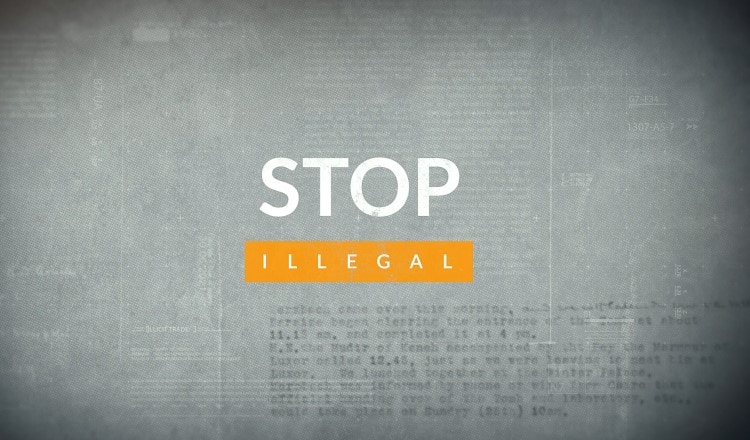
Prioritizing legitimate businesses to tackle the shadow economy: An interview with Bosnia’s Centre for Policy and Governance
6 MAY 2021

Around the world, countries are plagued by a phenomenon known as the shadow economy—informal labor markets that cloak significant portions of national economies and budgets.
Bosnia and Herzegovina’s Center for Policy and Governance is looking to help unmask this issue in the Western Balkans. PMI IMPACT—a global initiative supporting organizations to implement impactful projects against illegal trade—has awarded the center with a grant.
The center’s latest report, “Shedding Light on the Shadows: Exploring Informal Economy in Four South-East Europe Countries,” focuses on informal labor and the illegal trade of high-tariff goods. STOP: ILLEGAL spoke to Executive Director Adis Muhović to understand more about the report’s findings and what countries can do to tackle the issue of shadow economies.
STOP: ILLEGAL: What is the shadow economy, and why is it an issue?
Adis Muhović: The shadow economy represents economic activity that is unregistered with the authorities in the sense that it is untaxed and unregulated. That means buying goods and services from unregistered providers, or rather registered vendors that don’t issue a receipt for a transaction.
In the labor market, it manifests in two forms—most frequently through working without a formal employment contract, but also through underdeclared employment, where parts of full salaries are undisclosed and untaxed. Retail is the most affected sector; with other popular industries being affected, such as construction, manufacturing, auto repairs, transport, excise products, storage, catering, housework, gardening, and property maintenance. Ultimately, informal labor and trade happen when people believe it is difficult to detect and that they won’t get caught.
It affects both markets and broader society. As a result of these illegal schemes, reduced public revenues decrease the availability and quality of public services. Without formal employment contracts, people lose benefits and security, and can be exploited. For example, monthly wages as low as EUR 300 have been reported within the shadow economy. Furthermore, goods bought and sold often result from illicit trade. Furthermore, “Buying illegal” plays a significant role in supporting local and global criminal networks and illegal activity. This represents a major issue for countries in the Western Balkans, which are already affected by systemic corruption and political elites’ ties with illegal activities.
STOP: ILLEGAL: How prevalent is the shadow economy within the Western Balkans?
Adis Muhović: At 27 to 30 percent of GDP, it’s significantly above the EU average of 18 percent. Our research shows that just over a quarter of people purchase from unregistered providers, with 15 percent doing so 10 or more times a year. Yet, people don’t necessarily “go out” to buy illegal goods or services. The shadow economy is in plain view; customers simply purchase goods or services without a receipt, without questioning whether a provider is registered or not.
Cigarettes, cut tobacco, and clothes are the most frequently purchased items. Among populations involved in undeclared purchases, our research found the share of those who purchased cigarettes without a receipt, or bought illicit tobacco products varied from 35 percent in Croatia to 69 percent in Montenegro. Our findings concerning the share of informally acquired excise goods as part of the total consumption of such goods suggests this share is particularly high in the case of cigarettes. Combining all four countries, it could be said that a quarter of total cigarette consumption comes from illicit purchases. This share is highest in Montenegro, where it accounts for more than 40 perent of the total consumption. Aside from cigarettes, we found people buy car parts, alcohol, medical and beauty services, fuel, even food, on the shadow markets—and the list goes on.
While policymakers have committed to improving economies, and their efforts to tackle the shadow economy, the phenomenon itself remains critically under-researched. The lack of available data means public policies have had limited success. We wanted to help by contributing quality data and research on peoples’ motivations, perceptions, and attitudes toward the shadow economy. Thanks to PMI IMPACT’s support, we have gathered and presented evidence of the region’s informal labor and illegal trade. By sharing our findings, we hope to inform social and policy researchers/makers to help foster informed decision-making.
STOP: ILLEGAL: Why do people engage with the shadow economy?
Adis Muhović: The shadow economy is somewhat normalized in the region, meaning people are more prone to engage with it and will justify their actions. For some, poverty means buying illegally is the only way to survive. Our data highlighted the cost of goods and services as the main driver, with 55 percent buying goods and services illegally due to price.
Informal labor is more complicated. People evade tax for various reasons. Often, it’s either employer-led or it comes down to consumer perception—that is, the belief that you are better off financially by doing so. Our research revealed close to half, 40 percent, claim employers insist on paying undeclared wages, and 36 percent see tax evasion as means to boost income. Tax is another key driver of un(der)declared work, with pre-and post-tax wages in the region ranging from 38.8 percent to 40.3 percent, slightly above the OECD average of 36.15 percent.
While this is a complex matter, it demonstrates the information gap; we found that 18 percent do not want to lose social benefits if they are paid legally and declare their income. Alongside low tax morale and common perceptions of high taxation, people evade taxes because they are dissatisfied with public services. But the disconnect and lack of understanding of how the shadow economy and illicit trade worsens the economy is clear; less money going to public budgets means even worse public services.
STOP: ILLEGAL: What should governments and law enforcement do?
Adis Muhović: Present deterrents aren’t enough to challenge public attitudes toward the shadow economy. Of those we surveyed, 45 percent believe there is a low or very low chance of being caught engaging with informal labor providers and unregistered businesses. Some 45 percent of citizens believe there’s a very low chance of being caught working without a contract, rising to 49 percent for working with a contract but receiving partial wages cash-in-hand. Additionally, 41 percent believe there’s a low chance of being caught smuggling or illegally producing goods.
Addressing these issues requires a multifaceted approach. First, we recommend boosting employment by lowering the difference between pre-and post-tax wages/taxes on workers’ salaries, from current levels to nearer the OECD average. This brings more workers into the system and increases take-home pay, which boosts morale. It’s also important to review and reduce any incentives for un(der)declared work, making informal labor less attractive.
Governments must prioritize creating a supportive environment for businesses and entrepreneurs through regulatory change. Overregulation, in most cases lengthy, and sluggish procedures and compliance processes are pushing entrepreneurs into the shadow economy. Each market will have specific needs, but they can be broadly categorized as reforms promoting more favorable conditions and formal employment. This also means increasing monitoring and publicly prosecuting illegal business practices. Citizens must understand the likelihood of being caught is far higher and penalties are much greater than they might think.
Lastly, the authorities must increase public trust. This means helping citizens understand the roles that effective regulatory policies, as well as legitimate work, play in helping rather than hindering society. Public policies should aspire to shape an environment that deters consumers from seeking cheaper, illegal alternatives for legitimate goods and services through the shadow economy, as well as bring the illicit portion of the markets back to the formal economy in order to enable the growth of public revenues.
At the same time, stricter yet more flexible enforcement of existing laws will help boost public confidence as well as revenues. That means active prosecution of unregistered providers, but also establishing a partner-like relationship, and providing better support for businesses operating legally. Making compliance less expensive and nerve-racking, while increasing the risk and lowering the profitability of informal operations will incentivize compliance with the laws.
Overall, lasting, effective change will be determined by governments’ responses. If governments maintain the status quo and fail to address the financial and environmental barriers to legitimate employment and business, then society will continue to follow the status quo, too.
To find out more about PMI IMPACT and how it has supported its grantees to fight illicit trade.


